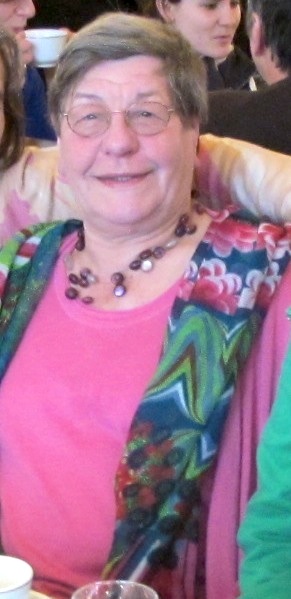
Claudia Ann Koonz is an American historian of Nazi Germany. Koonz's critique of the role of women during the Nazi era, from a feminist perspective, has become a subject of much debate and research in itself. She is a recipient of the PEN New England Award, and a National Book Award finalist. Koonz has appeared on the podcasts Holocaust, hosted by University of California Television, and Real Dictators, hosted by Paul McGann. In the months before the 2020 United States presidential election, Koonz wrote about the risks of autocracy in the United States for History News Network and the New School's Public Seminar.

Marie Juchacz was a German social reformer.

Alice Salomon was a German social reformer and pioneer of social work as an academic discipline. Her role was so important to German social work that the Deutsche Bundespost issued a commemorative postage stamp about her in 1989. A university, a park and a square in Berlin are all named after her.

Sigrid Weigel is a German scholar of literary studies, critical theory, a specialist of cross-disciplinary research, and a leading scholar of Walter Benjamin, Aby Warburg, and the cultural science (Kulturwissenschaft) around 1900. She held professorships at Hamburg, Zürich, and Berlin and established the internationally noted Advanced Studies “Center for Literary and Cultural Research” in Berlin. In 2016, she received the renowned Aby Warburg Prize of the City of Hamburg.

Ruth Hagengruber is a German philosopher, currently professor and head of philosophy at the University of Paderborn. She specialises in the history of women philosophers as well as philosophy of economics and computer science and is a specialist on Émilie Du Châtelet. Hagengruber is the director of the Center for the History of Women Philosophers and Scientists and founder of the research area EcoTechGender. She invented the Libori Summer School and is the creator of the Encyclopedia of Concise Concepts by Women Philosophers, for which she holds the position of editor in chief together with Mary Ellen Waithe.
Ludwig Eiber is a German historian and author. He is widely acknowledged as an expert on the post-World War II Allied war crimes trials of the Nazis. In particular, he has expertise in the Dachau trials.
Margarete Adam was a German feminist philosopher and university teacher.
Heide Wunder is a German historian.
Karin Flaake is a German sociologist and professor (retired) at the Carl von Ossietzky University Oldenburg. Her publications on the adolescence of young women and men are part of the literature of socio-psychologically oriented gender research. Another focus of her work is on the chances of changing gender relations in families.

Ilse Kokula is a German sociologist, educator, author and lesbian activist in the field of lesbian life. She was awarded the Order of Merit of the Federal Republic of Germany.
Heike Fleßner was a German educationalist and professor, whose work focused on social education and social work. She was a Professor of Social Pedagogy at the Carl von Ossietzky University of Oldenburg from 1996 until her retirement in 2009. Her scientific work focuses on analytics and conceptual developments in the field of gender- and diversity-conscious social education. For many years, Fleßner was involved in social policy and the institutional anchoring of public toddler care and early childhood education.
Claudia von Werlhof is a German sociologist and political scientist. She held the first professorship for women's studies in Austria, based at the Institute for Political Science at the University of Innsbruck.
Ilse Erika Korotin is an Austrian philosopher and sociologist. She researched and published on the history of ideas of Nazism. At the Institute for Science and Art in Vienna, she heads the Documentation Centre for Women's Studies. Her work focuses on feminist biographical research and history of science.
Angelika Schaser is a German historian.

Dieter Pohl is a German historian and author who specialises in the Eastern European history and the history of mass violence in the 20th century.

In Nazi Germany, lesbians who were sent to concentration camps were often categorized as "asocial", if they had not been otherwise targeted based on their ethnicity or political stances. Female homosexuality was criminalized in Austria, but not other parts of Nazi Germany. Because of the relative lack of interest of the Nazi state in female homosexuality compared to male homosexuality, there are fewer sources to document the situations of lesbians in Nazi Germany.
Irene Stoehr was a German feminist historical social scientist and journalist. Her main research interests were the feminist movement and gender history in the 20th century.
Eva Cyba is an Austrian sociologist. Her research, teaching and publications focus on sociological theories of social inequality, feminist theories and women's studies, in particular women in the world of work. She is the winner of the Käthe-Leichter-Staatspreis. Her book Gender and Social Inequality is considered a fundamental work of sociological gender research.

Sibylla Flügge is a German lawyer and retired professor at the Frankfurt University of Applied Sciences in the field of “Law of the Woman". She was a member of the Frankfurt Women's Council. Flügge is co-editor of the feminist legal magazine STREIT.
Johanna Kootz is a German librarian and sociologist. She was a pioneer of women's studies and advancement at Free University of Berlin. In 2004, she was awarded the Margherita von Brentano Prize for her life's work.








